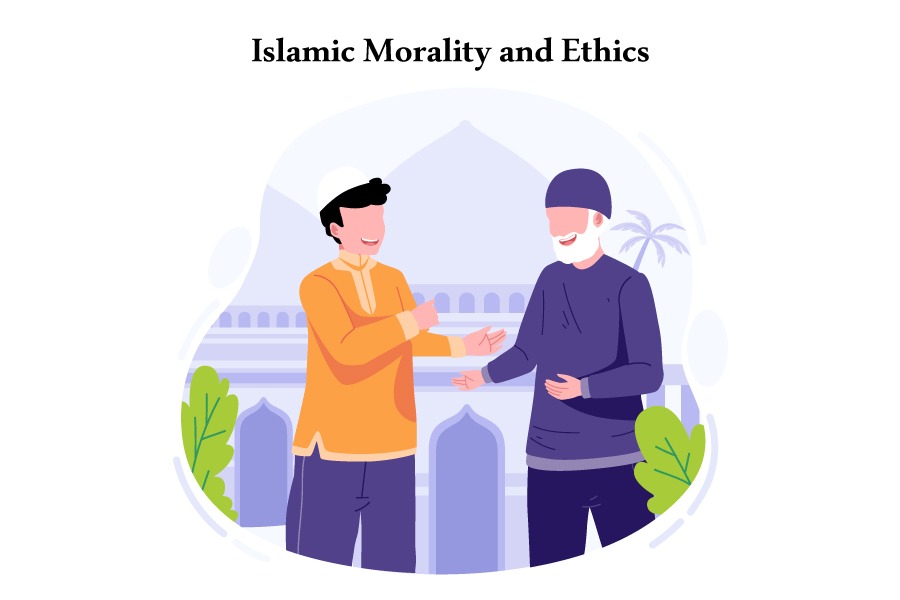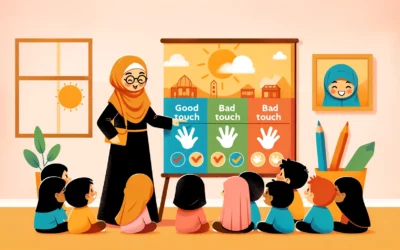In Islam, morality and ethics play a vital role in shaping the behavior and actions of individuals within the community. Islamic teachings emphasize the importance of leading a righteous and virtuous life, guided by ethical principles derived from the Qur’an and the teachings of Prophet Muhammad (peace be upon him). This article explores the concept of morality and ethics in Islam, highlighting the key principles and values that form the foundation of Islamic ethical teachings.
What are the ethics and morality of Islam?
Islam provides a comprehensive ethical framework that covers various aspects of life, including personal conduct, social interactions, and governance. Here are some key principles and values:
-
Tawhid
Islam emphasizes the oneness and unity of God (Allah). Muslims believe in the absolute sovereignty of God and recognize that all ethical values and moral obligations stem from this belief.
وَقَضَىٰ رَبُّكَ أَلَّا تَعْبُدُوٓا۟ إِلَّآ إِيَّاهُ
“And your Lord has decreed that you worship none but Him…” [Al-Isra’ 17:23]
And in the Quran Allah Also stated that,
وَمَا خَلَقْتُ ٱلْجِنَّ وَٱلْإِنسَ إِلَّا لِيَعْبُدُونِ
“And I (Allah) created not the jinn and mankind except that they should worship Me (Alone).” [Az-Zariyat 51:56]
-
Submission to God
Islam encourages individuals to submit themselves to the will of God and to live a life that aligns with His commandments. This submission includes obedience to God’s moral and ethical teachings.
-
Justice and fairness
Islam places great emphasis on justice and fairness in all aspects of life. Muslims are encouraged to act justly and treat others fairly, regardless of their social status, race, or religion.
إِنَّ ٱللَّهَ يَأْمُرُكُمْ أَن تُؤَدُّوا۟ ٱلْأَمَٰنَٰتِ إِلَىٰٓ أَهْلِهَا وَإِذَا حَكَمْتُم بَيْنَ ٱلنَّاسِ أَن تَحْكُمُوا۟ بِٱلْعَدْلِ ۚ إِنَّ ٱللَّهَ نِعِمَّا يَعِظُكُم بِهِۦٓ ۗ إِنَّ ٱللَّهَ كَانَ سَمِيعًۢا بَصِيرًا
Indeed, Allāh commands you to render trusts to whom they are due and when you judge between people to judge with justice. Excellent is that which Allāh instructs you. Indeed, Allāh is ever Hearing and Seeing. (AlQuran 4:58)
-
Honesty and truthfulness
Islam promotes honesty and truthfulness in speech and actions. Muslims are expected to be truthful, avoid deception, and uphold their commitments and promises.
Holy Prophet (SAW) said,
إِنَّ الصِّدْقَ يَهْدِي إِلَى الْبِرِّ، وَإِنَّ الْبِرَّ يَهْدِي إِلَى الْجَنَّةِ
Truthfulness leads to righteousness. And righteousness leads to Paradise.
-
Compassion and kindness
Islam encourages believers to show compassion and kindness to all individuals, including the poor, needy, and marginalized. Muslims are encouraged to practice acts of charity and help those in need.
-
Respect for human dignity
Islam teaches that all individuals, regardless of their background or beliefs, have inherent dignity and deserve to be treated with respect and fairness. Discrimination, prejudice, and oppression are considered unethical. all humans are equal regarding their inherent dignity and worth as beings created by Allah. The Quran states:
يَٰٓأَيُّهَا ٱلنَّاسُ إِنَّا خَلَقْنَٰكُم مِّن ذَكَرٍ وَأُنثَىٰ وَجَعَلْنَٰكُمْ شُعُوبًا وَقَبَآئِلَ لِتَعَارَفُوٓا۟ ۚ إِنَّ أَكْرَمَكُمْ عِندَ ٱللَّهِ أَتْقَىٰكُمْ ۚ إِنَّ ٱللَّهَ عَلِيمٌ خَبِيرٌ
“O mankind, indeed We have created you from male and female and made you peoples and tribes that you may know one another. Indeed, the noblest of you in the sight of Allah is the most righteous of you. Indeed, Allah is Knowing and Acquainted.” (Quran 49:13)
-
Modesty and humility
Islam promotes modesty in behavior, dress, and interactions. Humility is seen as a virtue, and arrogance and pride are discouraged.
-
Prohibition of harm
Islam prohibits actions that cause harm to oneself or others. This includes physical harm, as well as emotional, psychological, and financial harm.
-
Family and community values
Islam emphasizes the importance of strong family ties, caring for parents, and supporting the community. Muslims are encouraged to maintain good relationships with relatives and neighbors and contribute positively to society.
-
Personal accountability
Islam teaches that individuals are accountable for their actions and will be held responsible for their deeds in the afterlife. This belief serves as a moral incentive for Muslims to lead virtuous lives.
Concept of Morality and Ethics in Islam
In Islam, morality and ethics play a fundamental role in shaping the behavior and actions of individuals. The Islamic understanding of morality and ethics is based on the teachings of the Quran, the holy book of Islam, and the example set by the Prophet Muhammad (peace be upon him).
-
Islamic Morality
Islamic morality encompasses many virtues and values, promoting goodness, righteousness, and justice in all aspects of life. It emphasizes the importance of conscious and responsible decision-making and accountability for one’s actions. Muslims believe that adherence to moral principles leads to personal growth, spiritual development, and a harmonious society.
-
Islamic Ethics
The foundation of Islamic ethics is the concept of Tawhid, which is the belief in the oneness of Allah (God). This belief establishes the ultimate source of morality and serves as a guide for ethical conduct. Muslims understand that their actions should be in line with the teachings of Allah as revealed in the Quran and exemplified by the Prophet Muhammad (SAW).
Islamic ethics also encompass specific guidelines for various spheres of life, including family, business, governance, and social interactions. For example, Islam promotes the sanctity of marriage, respect for parents and elders, kindness to neighbors, and the prohibition of unjust economic practices such as usury (riba) and exploitation.
Source of Islamic Morality and Ethics
The primary sources of morality and ethics in Islam are the Quran and the Hadith (the recorded sayings and actions of the Prophet Muhammad).
The Quran provides moral guidance through its verses, which cover various aspects of human behavior. It emphasizes the importance of justice, honesty, compassion, humility, forgiveness, patience, and respect for others. Muslims are encouraged to cultivate these virtues in their personal lives, interactions with others, and their participation within society.
In the Quran, it is stated
قُلْ إِنَّمَا حَرَّمَ رَبِّىَ ٱلْفَوَٰحِشَ مَا ظَهَرَ مِنْهَا وَمَا بَطَنَ وَٱلْإِثْمَ وَٱلْبَغْىَ بِغَيْرِ ٱلْحَقِّ وَأَن تُشْرِكُوا۟ بِٱللَّهِ مَا لَمْ يُنَزِّلْ بِهِۦ سُلْطَٰنًا وَأَن تَقُولُوا۟ عَلَى ٱللَّهِ مَا لَا تَعْلَمُونَ
Say, “My Lord has only forbidden immoralities – what is apparent of them and what is concealed – and sin, and oppression without right, and that you associate with Allāh that for which He has not sent down authority, and that you say about Allāh that which you do not know.” (AlQuran 7:33)
In addition to the Quran, the Hadith, which are the recorded sayings and actions of the Prophet Muhammad, also provide a valuable source of moral and ethical teachings. The Prophet Muhammad is considered the epitome of moral character and is seen as an example for Muslims to follow in their daily lives.
The Quran and the Hadith are complementary sources of guidance in Islam. They work together to shape the moral framework for Muslims. The Quran provides general principles and values, while the Hadith offers practical examples and interpretations of these principles through the actions of the Prophet Muhammad.
Impact of Islamic Morality and Ethics on our daily life
Islamic morality and ethics play a significant role in shaping the daily lives of Muslims. They provide a framework for behavior and guide individuals in their interactions with others, their conduct, and their decision-making processes. Here are some ways in which Islamic morality and ethics influence daily life:
-
Islamic Morality and Individual
Islamic morality encourages individuals to cultivate virtues such as honesty, kindness, humility, patience, and forgiveness. Muslims strive to embody these qualities in their personal lives, treating others with respect and dignity. They seek to maintain a strong connection with Allah through prayer, remembrance, and self-reflection, which helps them uphold moral values in their thoughts and actions.
-
Islamic Ethics and Relationships
Islamic ethics emphasize the importance of maintaining healthy and respectful relationships. Muslims are encouraged to honor their parents and family members, fulfill their marital obligations, and raise their children with love and care. Islam promotes kindness, fairness, and justice in interactions with spouses, children, relatives, neighbors, and colleagues, fostering harmonious and compassionate relationships.
-
Social Responsibility and Islamic Morality
Islamic morality places great emphasis on social responsibility and encourages Muslims to actively contribute to their communities and society. This includes acts of charity (Sadaqah), volunteering, promoting justice and fairness, and supporting those in need. Muslims are encouraged to be mindful of the welfare of others, striving to make a positive difference in their communities.
-
Business Ethics and Islamic Ethics
Islamic ethics provide guidelines for ethical business conduct. Muslims are encouraged to engage in honest and fair business transactions and avoid deceit, exploitation, and unfair practices. Islamic principles prohibit usury (riba) and encourage trade that benefits all parties involved. Muslims are also encouraged to be accountable and fulfill their contractual obligations.
-
Moral Decision-Making
Islamic morality plays a role in guiding Muslims’ decision-making processes. They are encouraged to seek guidance from the Quran and the teachings of the Prophet Muhammad when faced with ethical dilemmas. Muslims strive to make choices that align with moral values and benefit both themselves and others.
-
Upholding Justice
Islam places a strong emphasis on justice and equity. Muslims are encouraged to stand up against oppression, support the rights of the marginalized, and advocate for fairness in all aspects of life. Upholding justice extends to personal, social, and political spheres, ensuring that everyone is treated equitably and justly.
Learn Islamic Morality and Ethics from the Quran and Hadith
Learning Islamic morality and ethics from the Quran and Hadith involves studying and reflecting upon the teachings found in these primary sources of Islam. Begin by reading and studying the Quran, paying particular attention to verses that address moral values and ethical principles. Find a reputable Islamic institute or Learn Quran Online platform and start learning Quran and reflect on their meanings, context, and the lessons they convey. It is helpful to study the Quran with reliable translations and consult reputable tafsir (exegesis) to gain a deeper understanding.
Engage with the Hadith literature, which contains the sayings, actions, and approvals of the Prophet Muhammad. Begin by reading collections such as Sahih al-Bukhari, Sahih Muslim, and others. Focus on Hadith that specifically discusses moral conduct, ethical values, and the Prophet’s exemplary character. in addition, consult knowledgeable scholars and seek their guidance in understanding and applying the moral teachings of Islam. Attend lectures, seminars, or study circles led by reputable scholars who can provide insights, interpretations, and practical applications of Islamic ethics.
















